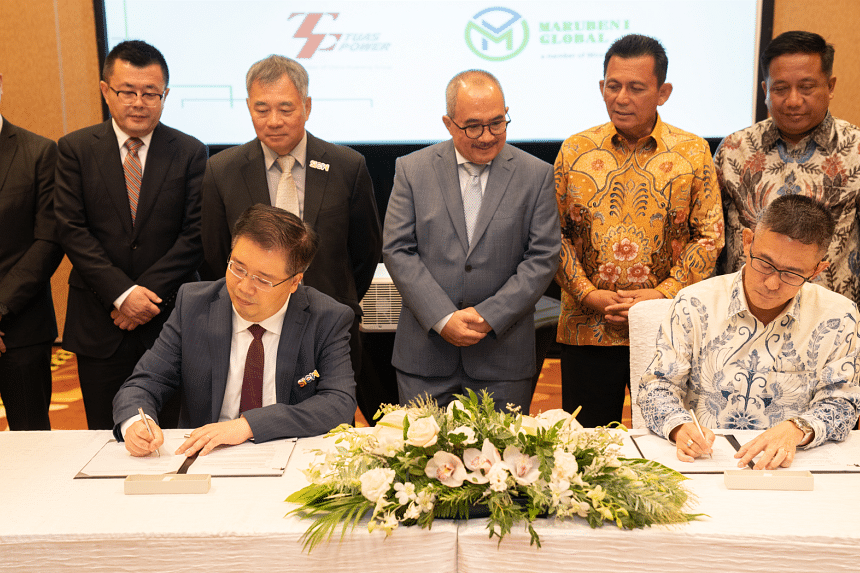JAKARTA – An Indonesian renewable energy company will begin building solar power plants costing US$9 billion (S$12.3 billion) on an island near Batam from 2024, with the aim of supplying low-carbon electricity to Singapore from 2027.
In an agreement signed on Oct 23, Marubeni Global Indonesia (MGI) committed to providing 600 megawatts (MW) of electricity to Tuas Power, Singapore’s top power generation company.
Tuas Power said it will submit its proposal to Singapore’s Energy Market Authority (EMA) by the end of November to import the electricity generated, which will be enough to power about 730,000 households.
MGI managing director Tjaw Hioeng said the first phase of construction will kick off in March 2024 on Galang Island, which is south of Batam and part of Riau Islands province.
“Our Singapore partner requires the electricity to be connected to the grid by the end of 2027,” he told The Straits Times, adding that the power will be transported through undersea cables.
The first solar farm will have a capacity of 2.55 gigawatt-peak (GWp) and a 7GWp battery-energy storage system.
Mr Hioeng said the second phase of the project will begin after the first solar farm commences operation in 2027. That phase will be located in nine less-populated or uninhabited islands near Batam.
Tuas Power’s chief operating officer Michael Wong told ST the company will take the first phase of exports of up to 400MW. This will increase as the project progresses towards the 600MW target upon the second phase’s completion.
The import of electricity, he added, is a “long-term supply that will span 25 to 30 years”.
Mr Wong said the 600MW would be about 15 per cent of Singapore’s target of importing 4GW of renewable energy by 2035.
The Republic plans to source this power from its South-east Asian neighbours, such as Indonesia, Laos, Malaysia and Vietnam.
Singapore’s EMA announced in September that it had given conditional approval to five companies to import a total of 2GW of low-carbon electricity a year from Indonesia. The importers are Pacific Medco Solar, Adaro Solar International, EDP Renewables Asia-Pacific, Vanda RE and Keppel Energy.
The EMA has also given conditional approval for Singapore to import 1GW from Cambodia and 1.2GW from Vietnam.
The Riau Islands provincial government is building solar power plants on six small islands in 2023 to meet domestic electricity demand.
Mr Akhmad Ma’ruf Maulana, chairman of the Riau Islands chapter of the Indonesian Chamber of Commerce and Industry, expects the MGI project to help lure investments in the manufacturing of components used in solar plants.
This is in line with the requirement set by the Indonesian government that any company keen to export electricity must source at least 60 per cent of the solar farm components domestically, he said.
Several companies have invested in Batam to build facilities to make solar cells and modules, he added.
“We hope the solar export projects can bring added value to us, create jobs and support the development of our solar industry,” Mr Akhmad told ST.
In April 2023, the Indonesian government named the MGI solar project as a “national strategic project”, highlighting its role in spurring economic growth and improving welfare in the region.
Mr Putra Adhiguna, who leads energy technology research in Asia for US-based think-tank Institute for Energy Economics and Financial Analysis, noted that solar power take-up is low in Indonesia as there are many barriers to achieving price competitiveness.
The electricity export would help shore up demand for Indonesia’s low-carbon electricity, and serve as a foundation to ensure investment growth in Indonesia.
Correction note: This story has been edited for accuracy.


